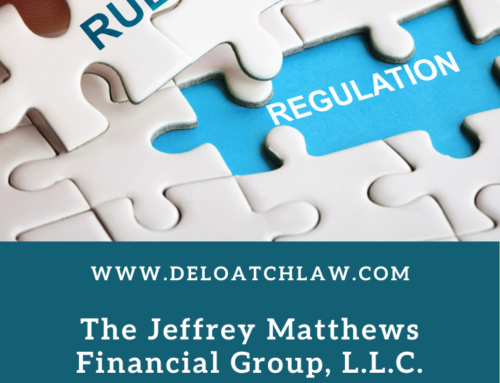 On June 30, 2020, the Securities and Exchange Commission (“SEC”) began enforcing Regulation Best Interest (“Reg BI”) and the use of the new Client Relationship Summary (“Form CRS”). These two new additions to the financial services industry are going to have an impact on both financial professionals and their retail clients. The big question is: how much of a meaningful impact will this have in furthering investor protection?
On June 30, 2020, the Securities and Exchange Commission (“SEC”) began enforcing Regulation Best Interest (“Reg BI”) and the use of the new Client Relationship Summary (“Form CRS”). These two new additions to the financial services industry are going to have an impact on both financial professionals and their retail clients. The big question is: how much of a meaningful impact will this have in furthering investor protection?
As the name implies, Reg BI is aimed at furthering the protection of retail investors. It requires certain registered financial professionals to now act in the best interest of their retail customers when making a recommendation regarding a security, investment strategy and/or account type. Some investors may find this addition a bit shocking, because they’ve probably presumed (incorrectly) that all financial professionals had to do this anyway. After all, these are the people they’ve entrusted their life savings with. However, not all financial professionals are the same and thus, up until now, have been held to differing legal standards of responsibility. Point in-fact, there is a meaningful legal distinction between a stockbroker, a registered representative of a broker-dealer (“BD”) and a financial advisor, a registered representative of an investment adviser (“RIA”).
Broker-Dealers and Stockbrokers
BD’s and their registered representatives, stockbrokers are governed by the Securities Exchange Act of 1934 (and the Financial Industry Regulatory Authority – “FINRA”). As their name implies, they are brokers – they act as a middleman. In the context of a securities transaction, they earn compensation in the form of commission for connecting a buyer of securities with a seller.
Although stockbrokers may make recommendations of a security transaction, it is ultimately the clients’ decision to buy or sell the security and not the broker’s. Thus, the broker, historically has only been legally responsible for having a reasonable basis for determining the suitability of the recommendation to that specific client (FINRA Rule 2111). Under this standard, the broker does not have an on-going fiduciary duty with the client. The stockbroker’s responsibility begins with the recommendation and ends with the entering of the transaction (if the client decides to follow the recommendation).
Registered Investment Advisors and Financial Advisors
RIA’s and their representatives, investment advisers, are governed by the Investment Adviser Act of 1940. They earn compensation in the form of advisory and/or management fees for providing advice and the active management of their clients’ assets. Thus, they typically have greater control of the investment decision process regarding the customer’s account. As such, they have an on-going fiduciary duty with their clients.
Goal of Reg BI – “Best Interest”
Over the past few decades, there has been a blurring of the lines between BD’s and RIA’s. BD’s and their registered representatives, stockbrokers, began offering advisory services (i.e. managed accounts and fee based accounts) in conjunction with their traditional retail brokerage services. These services have typically been the purview of RIA’s. In addition to these added services, many BD’s began referring to themselves as “financial advisers“, when in fact they are not. To be sure, both of these events have helped to blur the lines between BD’s (stockbrokers) and RIA’s (financial advisers).
Although the lines between BD’s and RIA’s, with regards to offered services became blurred, the legal obligations remained separate and distinct, for the most part. BD’s and stockbrokers maintained their limited responsibility of fair dealing and having a reasonable basis for determining the suitability of the recommendation, while RIA’s and financial advisers continued to be held to the higher fiduciary duty standard.
Reg BI attempts to close the divide between the duty of fair dealing vs fiduciary duty. It establishes the new standard of best interest for broker-dealers and stockbrokers. As the SEC explains in its June 5, 2019 press release, entitled: SEC Adopts Rules and Interpretations to Enhance Protections and Preserve Choice for Retail Investors in Their Relationships With Financial Professionals:
“…[R]egardless of whether a retail investor chooses a broker-dealer or an investment adviser (or both), the retail investor will be entitled to a recommendation (from a broker-dealer) or advice (from an investment adviser) that is in the best interest of the retail investor and that does not place the interests of the firm or the financial professional ahead of the interests of the retail investor.”
Broadly speaking, the best interest standard, in part requires BD’s and dual registrants to make greater disclosure to retail customers through the new “Form CRS” (for BD’s) and “Part 3 of Form ADV” (for investment advisers). Specifically, the new Form CRS requires the dissemination of all material facts relating to the scope, terms and potential conflicts of interest that may exist in the retail customer relationship. Indeed, this disclosure must be provided to all retail customers, who the SEC describes in its September 9, 2019 publication, entitled: Regulation Best Interest: A Small Entity Compliance Guide, as:
“[a] natural person, or the legal representative of such person who:
-
- receives a recommendation of any securities transaction or investment strategy involving securities from a broker-dealer; and
- uses the recommendation primarily for personal, family, or household purposes.”
More specifically, the type of information that must be contained in the new disclosures must be in plain language and include the following:
- The types of services offered;
- The fees, costs, conflicts of interest and the required standard of conduct associated with the services being offered;
- Whether the firm and the professional have any reportable legal or disciplinary history; and
- Where investors can find more information about the firm and the professional.
In addition to the increased disclosures by BD’s, RIA’s now must provide information regarding disciplinary actions against them (i.e. public disclosures) to all retail customers and prospective retail customers. Moreover, this disclosure must be in writing and include customer complaints, terminations and other negative disclosures.
Additionally, any broker or associated person, who is not also a supervised person of an RIA, will no longer be able to refer to themselves by the terms “advisor” or “adviser.”
In short, RIA’s have inherited some of the obligations of BD’s (i.e. broader public disclosure requirements) and BD’s have inherited some of the obligations of RIA’s (i.e. broader disclosure regarding fees, conflicts of interest and disciplinary history).
Moreover, the SEC has required that when this information is given to a client it cannot be buried in a stack of documents, thus rendering it the proverbial “needle in a haystack.” Rather, this information is required to be the “first among any documents” that are delivered to the client. Additionally, the Form CRS is required to be prominently displayed on the website of any adviser and must be in a format that is easily accessible.
Good First Step but Not Perfect
In short, these changes are great first steps, but there is still a great deal that is probably unclear to the average investor. In my experience, the typical investor is unaware there is a distinction between a BD and an RIA and thus, are unaware of the distinction between a stockbroker and a financial adviser, although Reg BI takes steps to clear up the distinction between the two through increased disclosure.
However, a real concern is that even when the typical investor is presented with the additional information required under Reg BI, they run the very real risk of suffering from “information overload” and defaulting to relying on the financial professional’s verbal explanations. It shouldn’t be a shock to anyone that some financial professionals may present the facts in the most favorable light to themselves when and if placed in this position. If this happens, it can negate the very purpose of the increased disclosure to the client.
Thus, Reg BI is a good first step for investors. Hopefully, more steps can be made in the journey of increased investor protection.








